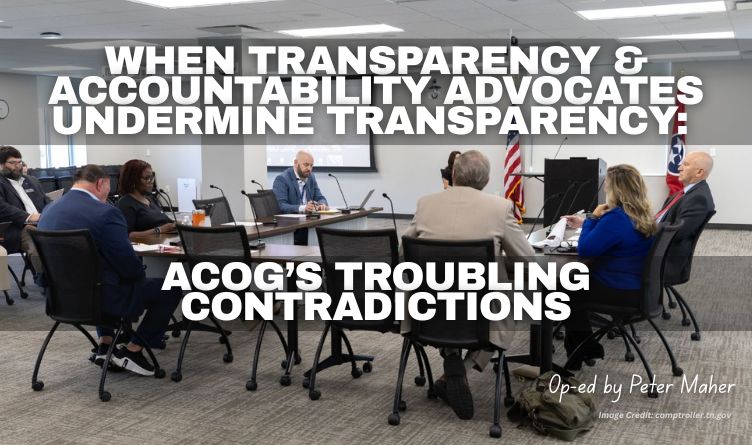Image Credit: comptroller.tn.gov
Submitted by Peter Maher –
The State of Tennessee’s group appointed Advisory Committee on Open Government (ACOG) was created to uphold the principles of transparency and accountability. But recent developments (and ACOG’s not holding statutory required annual public meetings between December 2020 and August 2025) suggest that some of its members—particularly those from the media and affiliated nonprofits—may be undermining the very laws they claim to defend and advise.
At the center of this concern is the troubling nomination of a new ACOG Co-Chair: a lawyer for Public Entity Partners (PEP) representing the Tennessee Municipal League, a taxpayer-funded organization, was recently nominated and named co-chair of ACOG. Publicly funded PEP’s attorney’s assert their legal opinion that PEP is not subject to the Tennessee Public Records Act (TPRA)—a law designed to ensure public access to government records.
What makes this ACOG nomination especially problematic is who made it: the editor of the Knoxville News Sentinel, who also both serves as the Society of Professional Journalist ACOG appointee and sits on the board of the Tennessee Coalition for Open Government (TCOG) who also receives a seat on Tennessee’s ACOG. Both the Knoxville Sun Sentinel newspaper and TCOG have long positioned themselves as champions of open records and press freedom. Yet here we see a media figure nominating someone who actively resists the application of open government laws to a publicly funded entity.

This contradiction raises serious questions:
- Can ACOG maintain credibility when its leadership includes individuals who oppose or claim exemption from 1A accountability laws?
- Why would a TN newspaper editor—whose profession depends on access to public records—support a nominee who claims special exemption from those same 1A laws?
- Is Tennessee’s open government infrastructure being quietly reshaped by insiders with conflicting interests?
Tennesseans deserves answers. ACOG’s mission is too important to be compromised by internal politics or opaque alliances. If media representatives and nonprofit advocates are using their influence to elevate voices that weaken transparency and accountability, then the committee risks becoming a gatekeeper for secrecy rather than a guardian of openness.
It’s time for a serious review of ACOG’s nomination process, ethical standards, and member affiliations. Transparency begins with accountability—and that must apply to those who claim to defend it.




One Response
How did these compromised pukes get appointed?